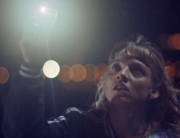Robin Wright is having a career revival. She became a household name as a 21-year- old in The Princess Bride, but never really found a signature film role after that. Her role in House of Cards has turned that all around, and The Congress is her first big starring vehicle released with her newfound stature. She even plays herself, to boot, and in a high-concept piece of speculative fiction, no less. Visions of Being John Malkovich are dancing in our heads!
The early parts of the film are the best, by far. We see Robin Wright, as herself, subjected to a steady stream of harsh judgments on her career, and we applaud what a good sport she is as her agent, Al (Harvey Keitel), and the studio chief (Danny Huston) rub her nose in for her knack of making bad career choices. Now, she’s offered the chance to make a whole lot of money by selling her essence to the studio so they can upload it into their CGI software and create an endless supply of movies with her likeness in them. She naturally tells the studio to get bent, but the impending blindness of her precocious son (are there any other kinds of children in movies?), Aaron (Kodi Smit-McPhee), leads her to take the plunge and use the cash to support him.
The best sequence is when we see her essence captured in a futuristic orb by the studio as she is compelled to run through the full gamut of expressions and emotions. It’s probably some of the most difficult acting she has ever done, and it is, as Keitel tells her, “her last performance,” since she is now forbidden from taking any parts ever again, as that would be competition against the studio’s version of her. It’s a great performance.
At this point, viewers are excited to see what her life as a husk of her former self would be like. Does she regret the sacrifice she made for her son? Is she happy? Has she gone insane? It would have been satisfying to see the effects of the choice dramatized. Instead, the entire second half of the long 122-minute film is animated. You wait and wait for the live-action actors to come back, and they do for a few minutes at the very end, but by then you have stopped caring.
The animation is the result of a new drug that is evidently all the rage in The Future. It makes you feel like a cartoon and see the world as a cartoon landscape, because that’s where our escalating obsession with artificiality and constant entertainment will evidently lead. Naturally, Robin Wright is trapped in a hallucinatory state that will not end. Unfortunately, we feel trapped in an animated film that will not end. Jon Hamm appears late as the voice of the animator who worked for years with scans of Robin Wright, leading him to develop a keen obsession with her. Romance ensues, sort of. By that point, it’s clear that the characters we cared about in the early going, Aaron, Al, human Robin Wright, aren’t coming back, and neither, most likely, will your interest.
High-concept speculative cinema needs to have wild, inventive ideas, sure, but it also needs to take its time explaining them and grounding them in some kind of logic. In The Congress, the idea of a computer that can absorb all possible information about a person and a drug that causes, shall we say, animania, are explained about as minimally as possible. (By the way, we encounter the titular congress for barely a few minutes in the animated zone, and are given no explanation for what it is.) We get more information about why and how Earth’s yellow sun gives Superman his powers in Man of Steel, a silly comic book movie, than we do about any of the conceits in this ostensibly intellectual sci-fi capitalist critique. The joke about Robin Wright having a talent for picking dud scripts? Oh boy, was that on the mark.







Leave A Comment